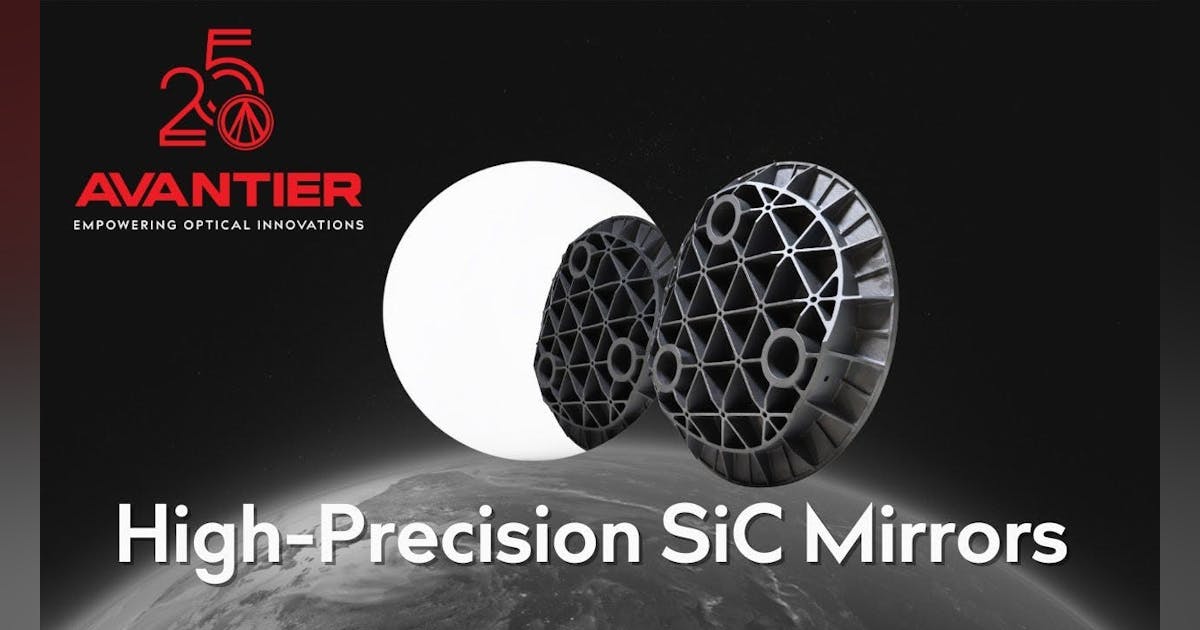High-Precision Silicon Carbide (SiC) Mirrors by Avantier: Advanced Optics for Space & Defense
What if the clearest images of the cosmos and the most dependable defense optics relied not on traditional glass, but on a meticulously designed ceramic? Welcome to Avantier’s realm of high-precision silicon carbide (SiC) mirrors, designed to thrive in the harshest environments.
SiC Mirrors: The Material Marvel Driving Today’s Optics Innovation
Consider the complexities of launching a telescope into orbit. Every gram conserved potentially means either more payload or reduced fuel consumption. Even a slight thermal expansion could blur once-in-a-lifetime images of distant celestial bodies. This is where silicon carbide (SiC) proves indispensable, forming the backbone of modern advanced optics for space, defense, and high-tech sectors.
Why Silicon Carbide?
- Lightweight Champions: SiC mirrors boast a weight reduction of up to 70% compared to conventional glass. This lightness translates to cost-efficient missions and enhanced maneuverability for satellites, drones, and defense optics.
- Strength & Stiffness: Known for its robust mechanical properties, SiC retains structural integrity even amidst the rigors of rocket launches or supersonic speed flights.
- High Thermal Conductivity: An excellent heat conductor, SiC efficiently dissipates heat from sensitive electronics and optics, maintaining stable performance even in fluctuating temperatures.
- Extreme Thermal Stability: SiC mirrors withstand high and varying temperatures without losing their optical precision.
- Durable & Resilient: Resistant to oxidation and chemical deterioration from space radiation, harsh atmospheres, or chemical weapon exposure, SiC is built for longevity.
The Avantier Advantage: Innovating Custom SiC Mirrors
From Design to Deployment: Tailored Engineering
Avantier is not merely a manufacturer; they are a dedicated team of engineers, scientists, and optical designers committed to realizing even the most complex specifications.
- Size Range: Producing SiC mirrors from 25 mm to 800 mm, Avantier offers various custom shapes to align with specific applications.
- Ultra-Precise Tolerances: With dimensional tolerance of ±0.1 mm and surface precision under RMSI < 16 nm, distortion-free imagery is a reality—vital for interplanetary observation.
- Clear Aperture: Utilizing up to 90% of the mirror surface, maximizing data acquisition potential.
- Adaptable Coatings: Options include aluminum, silver, or gold coatings for high reflectivity over 400–12,000 nm, ensuring endurance against extreme conditions.
Next-Generation Fabrication: Redefining Boundaries
Avantier employs state-of-the-art manufacturing techniques, such as:
- Ion Beam Figuring (IBF): For atomic-scale surface accuracy.
- Magnetorheological Finishing (MRF): Ensures defect-free, ultra-smooth surfaces.
- Chemical Mechanical Polishing (CMP): Provides consistency and ultra-low surface roughness at a sub-nanometer level.
These combined processes allow Avantier’s mirrors to achieve exceptional surface flatness, up to λ/100 RMS.
Case Study: Stellar Performance in Aerospace
Consider a custom SiC mirror designed for satellite imaging:
- Specifications: A 379 x 260 x 85 mm mirror with ±0.1 mm tolerance, RMSI < 16 nm, and 90% aperture.
- Outcomes: After two years in space, it delivered distortion-free images, reduced satellite weight by 15%, and required no post-launch corrections or maintenance.
- Impact: Enhanced imaging precision is critical for scientific research, disaster response, and military intelligence.
Key Applications: Where SiC Mirrors Change the Game
Space Exploration
- Light Gathering: Large, lightweight mirrors enhance sensitivity to faint astronomical targets.
- Thermal Stability: Vital for clear imaging in orbit, where sunlight and shadow shift rapidly.
Defense & Military
- High-Speed Scanning: Agile movement enables rapid laser targeting or area scanning without lag.
- Survivability: Withstands thermal shock and chemical exposure on the battlefield.
Semiconductor Lithography
- Precision Patterning: Crucial for producing next-gen computer chips where even slight deformations can affect yield.
Laser & Lidar Systems
- Consistent Performance: High reflectivity and stable surfaces support mapping and rangefinding under varying conditions.
Beyond Technology: The Team Driving Precision
Science alone doesn’t fuel this innovation—Avantier’s engineers blend rigorous academic research, hands-on fabrication, and relentless inquiry to push the boundaries of what’s possible.
A project recall: During a Mars orbiter mission, a change in launch mass prompted a redesign. Avantier swiftly adapted and delivered on schedule—showcasing their remarkable agility and expertise.
Client FAQs
Q: How do SiC mirrors compare to beryllium or glass optics?
A: SiC equals beryllium in lightness and stiffness but outperforms in chemical stability and safety. It is also significantly lighter and thermally stable compared to traditional glass.
Q: Can SiC mirrors function in cryogenic conditions?
A: Certainly. SiC remains stable across a temperature range from deep cryogenic to high temperatures, making it suitable for space telescopes and military optics.
Q: Are there custom coatings available?
A: Yes, Avantier provides custom coatings like aluminum, silver, and gold designed for enhanced reflectivity and durability, even in hazardous environments.
Expert Insights on Selecting a SiC Mirror
- Prioritize Surface Accuracy: Aim for sub-20 nm RMS surface accuracy for high-resolution imaging.
- Choose the Right Coating: Align coatings with the application spectrum—gold for IR, aluminum for visible or UV.
- Consider Clear Aperture: Maximize this for data-intensive optics.
- Inquire About Thermal Cycling: Verify your mirror’s endurance to expected temperature ranges.
Future Trends in SiC Optics
- Additive Manufacturing: Emerging 3D printing methods promise quicker, complex lightweight designs.
- Hybrid Designs: Combining SiC with adaptive optics for real-time shape control could revolutionize large telescope systems.
- Surface Nano-Engineering: Offers potential for improved reflectivity, resilience, and maintenance.
SiC in Pop Culture
For fans of sci-fi like “The Expanse” or “Interstellar,” the crisp images showcased are enabled by technologies akin to SiC optics, a staple in today’s cinematic depiction of space technology.
The Avantier Commitment
Choosing Avantier means partnering with a team dedicated to your success, providing support from initial design to post-launch. Whether you’re engaged in research, defense, or semiconductor innovation, Avantier is here to help create optical excellence.













